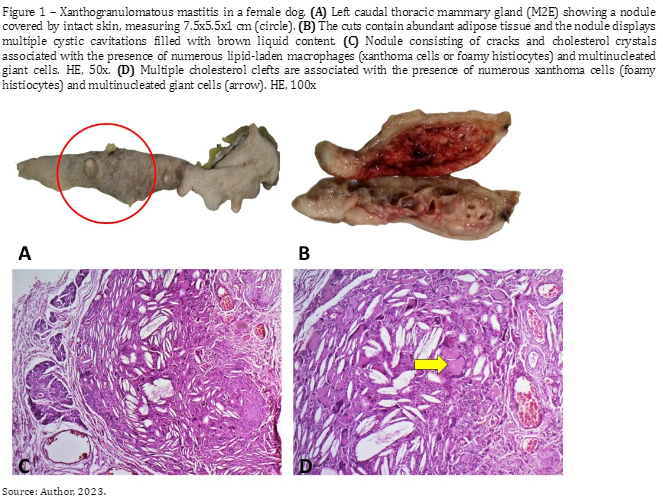Xanthogranulomatous mastitis in a female dog
DOI:
https://doi.org/10.21708/avb.2024.18.2.12430Abstract
Xanthogranulomatous mastitis (MXG) is a rare chronic inflammatory condition of the breast. In women, it raises concern and requires a biopsy due to the clinical-radiological similarity with breast neoplasia. The definitive diagnosis is given through histopathological examination. In canine females, chronic benign non-neoplastic lesions in the mammary glands are not frequently described, such as MXG. The objective of this work is to describe the clinicopathological findings of a case of xanthogranulomatous mastitis in a female canine. The case occurred in a female Pinscher breed, 8 years old, not castrated, who presented irregular heat, in addition to a history of galactorrhea and treatment with antigalactogenic drugs. The physical examination revealed the presence of a nodule in the left mammary chain, affecting the caudal thoracic mammary gland (M2E). Due to the fear that it was a malignant neoplasm, the treatment was a radical mastectomy of the left mammary chain, followed by an anatomopathological examination of all glands. Histologically, the M2E nodule was made up of cracks and cholesterol crystals associated with the presence of numerous lipid-laden macrophages and multinucleated giant cells, characterizing it as xanthogranulomatous mastitis.
Downloads

Downloads
Pubblicato
Fascicolo
Sezione
Licenza
Copyright (c) 2024 Acta Veterinaria Brasilica

TQuesto lavoro è fornito con la licenza Creative Commons Attribuzione 4.0 Internazionale.
Autores que publicam na Acta Veterinaria Brasilica concordam com os seguintes termos: a) Autores mantém os direitos autorais e concedem à revista o direito de primeira publicação, com o trabalho simultaneamente licenciado sob a Licença Creative Commons Attribution que permite o compartilhamento do trabalho com reconhecimento da autoria e publicação inicial nesta revista. b) Autores têm autorização para assumir contratos adicionais separadamente, para distribuição não-exclusiva da versão do trabalho publicada nesta revista (ex.: publicar em repositório institucional ou como capítulo de livro), com reconhecimento de autoria e publicação inicial nesta revista. c) Autores têm permissão e são estimulados a publicar e distribuir seu trabalho online (ex.: em repositórios institucionais ou na sua página pessoal) a qualquer ponto antes ou durante o processo editorial, já que isso pode gerar alterações produtivas, bem como aumentar o impacto e a citação do trabalho publicado (Veja O Efeito do Acesso Livre).


 Esta obra está licenciada com uma Licença
Esta obra está licenciada com uma Licença 